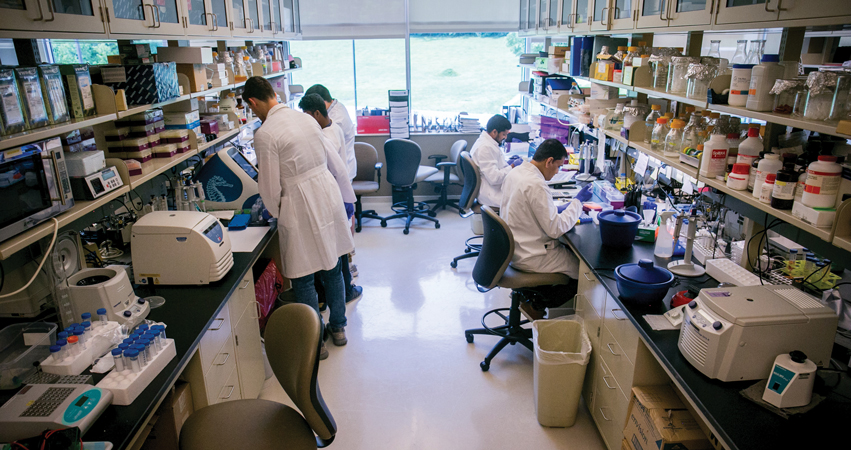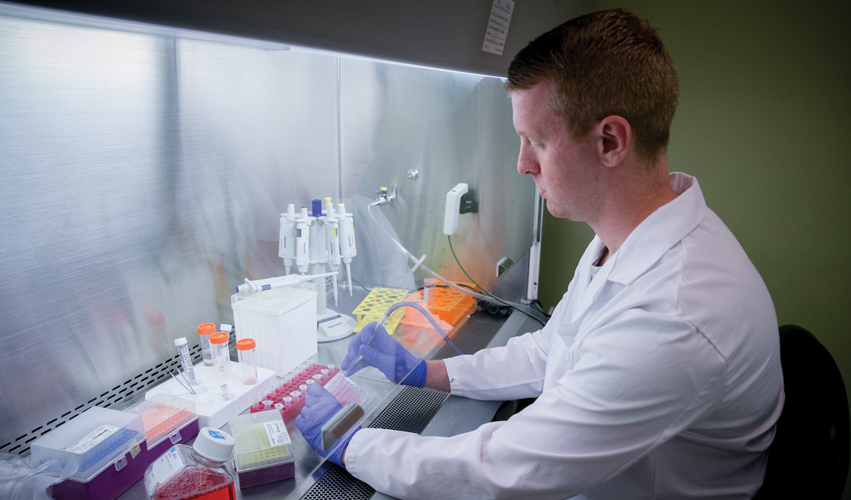Cancer Under the Microscope at UICOMP

UICOMP research leads to new discoveries, partnerships and collaborations—and is an economic asset to the community.
Research at the University of Illinois College of Medicine Peoria employs dozens of people in its laboratories and attracts physicians and scientists from around the world. The type of research conducted at UICOMP centers on four distinct areas: cancer, neuroscience (such as Alzheimer’s disease, stroke and toxicology), health outcomes and medical education, particularly as it relates to simulation.
Since the construction of the Cancer Research Center in December 2011—a $13 million public-private investment—cancer research and development continues to be the primary focus at UICOMP. This research aims to improve cancer therapies and eliminate the disease around the globe. Led by Dr. Bento Soares—world-renowned for his contributions to genomics, genetics and cancer biology, including the Human Genome Project—here is a glimpse at the innovative cancer research underway at 1 Illini Drive in downtown Peoria.
Brain Tumor-Initiating Cells
Dr. Bento Soares and Dr. Sergey Malchenko are studying brain tumor-initiating cells, which are responsible for tumor growth and drug resistance. Despite their significance, little was known about these types of cells until recently because of the difficulty in obtaining sufficient quantities to study. The group developed a model of tumors, a family of malignant childhood brain tumors resistant to current treatments, and used it to isolate large quantities of the tumor-initiating cells. With this, they were able to characterize these cells, how they function, and identify leads for developing new drugs. The group is currently conducting studies using existing drugs in new ways as a targeted therapy for this very aggressive childhood cancer.

Glioblastoma
Dr. Kiran Velpula and neurosurgeon-scientist Dr. Andrew Tsung are studying novel treatments for glioblastoma, the most common and deadly form of brain cancer. This is the type of cancer Arizona Senator John McCain is battling and from which Senator Ted Kennedy died in 2009.
Working in the young field of metabolic oncology, they are targeting key molecules necessary for cancer cells to live and grow. By robbing cancer of energy (and leaving healthy brain cells intact), the hope is that glioblastoma can be treated more effectively. Employing burgeoning young medical student researchers, post-doctoral fellows and graduate research assistants, the laboratory at UICOMP is diverse and spans multiple areas. It is actively supported by the local community—with special recognition to the Mark Linder Walk for the Mind, an annual event raising awareness and funds to support local brain tumor research to advance cancer treatment.
The Gut Microbiome and Leukemia
Dr. Peter Gyarmati leads a group working to increase the survival rate and quality of life for leukemic patients. He and his team have found that the gut microbiota is a main source of pathogens in bloodstream infections—the major cause of death in leukemia. They are studying the structure of the intestinal environment in patients with leukemia by looking at massive amounts of DNA through an automated process. The aim is to develop new treatment options to prevent bacteria from entering the bloodstream from the gut, reducing the risk of infectious complications and increasing the survival rate of patients with leukemia.
Dr. Yajing Song, a researcher in the group, developed an inexpensive, rapid technique using ordinary filter paper, which allows bedside pathogen detection. Early detection can reduce infection-related death in leukemia.

UICOMP medical student Wade Smith grows pediatric brain cancer cells in the lab.
Medulloblastoma
Dr. Swapna Asuthkar and her team conducts research on medulloblastoma, the most common type of malignant pediatric brain cancer. Specifically, her lab is interested in immune checkpoints and epigenetics. Immune checkpoints involves analyzing points in healthy cells that contribute to proper immune system function, but are also used by cancers to develop and progress. Recent findings in their lab show how cancer cells can “hide” from the immune system. They believe this process will provide clues for the development of more effective treatments for this aggressive disease.
The other focus of the lab involves epigenetics, which has recently become a large part of cancer research. Epigenetics is the study of factors that influence gene expression—what causes genes to switch “on” or “off.” Their team is focused on one molecule in particular that increases transcription of genes that lead to medulloblastoma development and progression. If this process is halted, the cancer is more likely to respond to treatment.
Pancreatic Cancer
Pancreatic cancer is often so deadly because by the time it is diagnosed, it is usually too late to treat successfully. This is the type of cancer Steve Jobs died from in 2015. Pancreatic cancer at an early stage shows almost no symptoms. Tumors need nutrients to grow, and for this growth, they attract blood vessels. Successful suppression of these tumor-induced blood vessels can “starve” tumor growth. Dr. Christopher Gondi and his team use genetically modified zebrafish, which possess blood vessels that glow green under special lighting. With these special zebrafish as a model, they are able to study and develop methods to suppress tumor-induced blood vessel growth.
The pancreatic cancer research at UICOMP is supported locally by the Springfield-based McElroy Foundation as well as the Theresa Tracy Strive to Survive Foundation by way of their annual Theresa Tracy Trot.
Cell Channels and Receptors
Dr. Eleonora Zakharian and her team of researchers are focused on studying temperature and pain receptors and their relationship to tumor development among various cancers. In one current project, they are focusing on unique high-energy polymers produced by cell mitochondria. They have found these polymers play immense roles in energy metabolism and calcium homeostasis—key to the life and death of a cell and crucial for cell renewal, which can be impaired in cancers.
Recently, Dr. Zakharian’s group discovered a previously unknown function for a specific pain receptor in the nervous system and spinal cord. The finding sheds light on how the body manages inflammatory pain and could offer new ways to address pain in patients with cancer. Other important discoveries in her lab include finding a new testosterone receptor. This particular protein is found in abundance in the prostate and in prostate cancers. The discovery may lead to new methods for treating prostate cancer by limiting its growth or shrinking tumors.

Dr. Eleonora Zakharian works to identify cancer cell energy sources.
Cancer Immunology
Dr. Sang-Oh Yoon has spent more than 15 years studying various aspects of tumor biology at Harvard Medical School, the University of Cincinnati College of Medicine, Cornell University’s Sandra and Edward Meyer Cancer Center, and the last two at UICOMP.
His research spans various cancers—including skin cancer, cervical cancer, gastric cancer, thyroid and lymphoma cancer—with dozens of publications. Dr. Yoon’s expertise is in cell signaling. He decodes cancer cell signals biochemically and molecularly that cancer cells use to grow and become resistant to treatment. His goal is to develop new ways to overcome cancer’s resistance to improve successful treatment.
Health Outcomes
Not all of the research at UICOMP is done under a microscope. Dr. Carl Asche and his team in the Center for Outcomes Research (COR) perform economic evaluation and statistical analysis on a range of healthcare topics and activities, including multiple sclerosis, low back pain therapies, respiratory disorders, cardiovascular and gastrointestinal disorders, as well as cancer.
COR has published six scholarly articles and provided more than 40 presentations on oncology-related findings alone. Among them is a look at the medical costs associated with therapy in adults with colorectal cancer, and evaluating the treatments and costs of prostate cancer patients treated within an inpatient and hospital-based outpatient setting. An upcoming study funded by OSF HealthCare Illinois Neurological Institute will look at caregivers of patients with cancer. The aim: to develop an effective intervention program to reduce caregiver’s stress and improve their psychological well-being. iBi
Learn more about UICOMP research at peoria.medicine.uic.edu/research.

